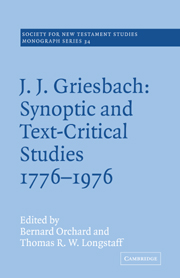Book contents
- Frontmatter
- Contents
- Portrait of J. J. Griesbach
- Copy of Colloquium announcement
- List of participants and selected observers
- Preface
- Abbreviations
- 1 The genesis of the Colloquium
- 2 Johann Jakob Griesbach: his life, work and times
- 3 The Gospel synopsis from 1776 to the present day
- 4 Griesbach's answer to the Synoptic Question
- 5 Commentatio qua Marci Evangelium totum e Matthaei et Lucae commentariis decerptum esse monstratur
- 6 A demonstration that Mark was written after Matthew and Luke
- 7 Griesbach and the development of text criticism
- 8 Modern text criticism and the Synoptic Problem
- 9 At the Colloquium's conclusion
- 10 The Griesbach Hypothesis: a bibliography
- Notes
- Appendix
- Index
7 - Griesbach and the development of text criticism
Published online by Cambridge University Press: 23 December 2009
- Frontmatter
- Contents
- Portrait of J. J. Griesbach
- Copy of Colloquium announcement
- List of participants and selected observers
- Preface
- Abbreviations
- 1 The genesis of the Colloquium
- 2 Johann Jakob Griesbach: his life, work and times
- 3 The Gospel synopsis from 1776 to the present day
- 4 Griesbach's answer to the Synoptic Question
- 5 Commentatio qua Marci Evangelium totum e Matthaei et Lucae commentariis decerptum esse monstratur
- 6 A demonstration that Mark was written after Matthew and Luke
- 7 Griesbach and the development of text criticism
- 8 Modern text criticism and the Synoptic Problem
- 9 At the Colloquium's conclusion
- 10 The Griesbach Hypothesis: a bibliography
- Notes
- Appendix
- Index
Summary
Introduction
‘It is not that such a mode of conducting critical enquiries would not be very convenient, that Griesbach's theory is universally abandoned by modern scholars, but because there is no valid reason for believing it to be true.’ So wrote Scrivener in his Introduction to the Criticism of the New Testament.
This conclusion implies two judgements about Griesbach's theory, first, that it is fundamentally wrong and, secondly, that it had little or no effect on the subsequent development of the New Testament textual criticism. Both these judgements deserve further examination and it may be convenient for our purposes to take the second first.
The lasting influence of Griesbach's text-critical theory
Preliminary remarks
Griesbach, building on the work of his teacher Semler, grouped his witnesses in three main classes, the Alexandrine, the Western and the Byzantine. This threefold division, as we shall see, had a great influence on subsequent textual criticism.
Before we examine the history of this influence we may notice two points which will require further consideration, the actual assignment of the witnesses to the several classes and the use made of these classes in the attempt to recover the original form of the text.
In Griesbach's assignments we may notice two features.
- Type
- Chapter
- Information
- J. J. Griesbach: Synoptic and Text - Critical Studies 1776–1976 , pp. 136 - 153Publisher: Cambridge University PressPrint publication year: 1979



